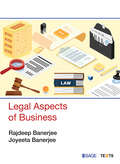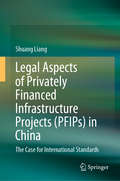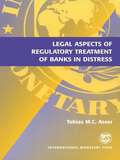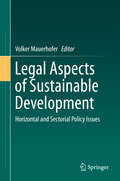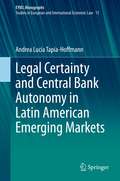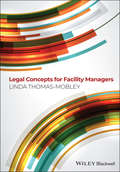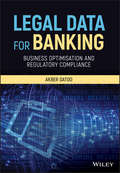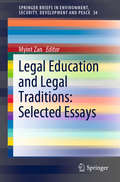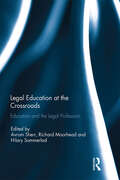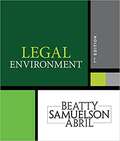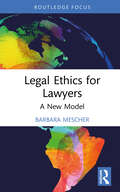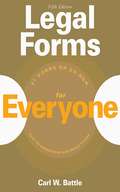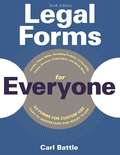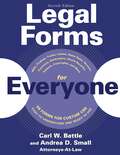- Table View
- List View
Legal Aspects of Business
by Rajdeep Banerjee Joyeeta BanerjeeProviding a broad overview of the overlapping worlds of business and law, this textbook is an extensive guide on how different laws impact businesses. Written by practising experts, Legal Aspects of Business is an invaluable textbook for readers who want to gain a basic understanding of the intertwined worlds of law and business. The book explores multiple landmarks, as well as lesser known cases, to explain the nuances and particularities of different business laws in India. Its detailed explanations illustrated using legal precedents will help readers to understand the consequences a law can have on a business decision. The book includes updated and recent amendments as well as fresh judgements relevant to businesses. This book will prove to be a valuable companion for MBA and law students who look forward to having a comprehensive yet compact introduction to the field of law and its importance to business. Key Features: • Summaries and explanations of important Indian and foreign cases • Contains up-to-date information on amendments and their implications • Easy-to-follow discussions that do not use legal jargons • Extensive review exercises to ensure maximum retention
Legal Aspects of Corporate Management and Finance
by Jethro K. Lieberman Don Mayer Daniel M. Warner George J. SiedelMayer, Warner, Siedel and Lieberman's Legal Aspects of Corporate Management and Finance is an up-to-date textbook that covers key legal issues relating to corporate management and finance. The text is organized to permit instructors to tailor the materials to their particular approach. The authors take special care to engage students by relating law to everyday events with their clear, concise and readable style.
Legal Aspects of Crowdfunding (Ius Comparatum - Global Studies in Comparative Law #55)
by Caroline KleinerThis book offers a comparative perspective on 18 countries’ legal regulation of crowdfunding. In the wake of the financial crises of 2008, use of this alternative financing method has increased substantially, in various forms. Whereas some states have adopted tailor-made regimes in order to regulate but also encourage this way of financing projects, allowing loans to be made by non-banking institutions, others still haven’t specifically addressed the subject. An analysis of these diverse legislative stances offers readers a range of legal solutions for managing crowdfunding activities with regard to e.g. protecting investors, imposing limits on project owners, and finally the role and duties of intermediaries, i.e., companies operating crowdfunding platforms. In addition, the content presented here provides a legal basis for states and supranational organizations interested in regulating this phenomenon to achieve more legal certainty.
Legal Aspects of Cruises (Ius Comparatum - Global Studies in Comparative Law #56)
by Cecilia Fresnedo de AguirreThis book presents a comparative study on various issues regarding legal aspects of cruises – mainly, the importance of the cruise business, the impact of cruise tourism, general and specific rules applicable to cruises, liability issues, cruise passengers as consumers, package travel, labor rules for cruise workers, relevant rules on ports (e.g. on taxes, costs and rates charged to cruises in different ports), rules on the environmental impact of cruises, jurisdiction, arbitration, and choice of law in cruise contracts, and general conditions used by companies offering cruise services – in order to identify the current sources of law on these matters and determine whether or not they are appropriate and sufficient. Combining a general report with individual national reports, the book offers not only a general overview, but also the perspectives of selected jurisdictions in the Americas, Europe and Asia, namely: Argentina, Belgium, Bulgaria, Germany, Japan, Poland, Romania, Spain, Turkey, the United States, and Uruguay.
Legal Aspects of Entrepreneurship: A Conceptual Framework
by Constance E. BagleyIdentifies many of the legal issues likely to arise in the course of starting and growing a company. Suggests strategies not only for ensuring compliance with the law but also for using the law and the legal system to increase predictability, maximize value, marshal resources, and manage risk. Explains why entrepreneurs and managers cannot just rely on lawyers to deal with the legal aspects of business and offers ways to manage legal risk and handle legal disputes. Also describes the relevance of a variety of laws to managers and entrepreneurs, including intellectual property, securities regulation, taxes, contracts, employment, business organization, product liability, environment, and alternative dispute resolution.
Legal Aspects of Implementing the Cartagena Protocol on Biosafety
by Marie-Claire Cordonier Segger Frederic Perron-Welch Christine FrisonThis book, the first in a new series that focuses on treaty implementation for sustainable development, examines key legal aspects of implementing the Cartagena Protocol on Biosafety to the UN Convention on Biological Diversity (CBD) at national and international levels. The volume provides a serious contribution to the current legal and political academic debates on biosafety by discussing key issues under the Cartagena Protocol on Biosafety that affect the further design of national and international law on biosafety, and analyzing recent progress in the development of domestic regulatory regimes for biosafety. It also examines the legal, political, economic, and practical challenges and solutions encountered in recent efforts to develop and implement domestic biosafety regulations, with a focus on developing countries. In the year of the fifth UN Meeting of the Parties to the Cartagena Protocol on Biosafety, at the signature of a new Nagoya-Kuala Lumpur Protocol on Liability and Redress, this timely book examines recent developments in biosafety law and policy.
Legal Aspects of Marketing and Sales
by Jethro K. Lieberman Don Mayer Daniel M. Warner George J. SiedelMayer, Warner, Siedel and Lieberman's Legal Aspects of Marketing and Sales is an up-to-date textbook that covers legal issues that students who will work in marketing or with marketing managers must understand. The text is organized to permit instructors to tailor the materials to their particular approach. The authors take special care to engage students by relating law to everyday events with their clear, concise and readable style.
Legal Aspects of Privately Financed Infrastructure Projects (PFIPs) in China: The Case for International Standards
by Shuang LiangThis book discusses the reform and improvement of Chinese legislation on Privately Financed Infrastructure Projects (PFIPs), the goal being to help its implementation in China satisfy international standards. In this regard, current Chinese laws are found to be insufficient when it comes to reducing risks to PFIPs, due to certain shortcomings. Therefore, the corresponding legislation must be reformed and improved.The Legislative Guide and Model Provisions drafted by UNCITRAL are discussed as the international standards that can effectively guide this reform; other countries’ laws on PFIPs provide supplementary reference material.Given the rapid rise in the use of PFIPs in China, this book offers a strong theoretical basis for improving Chinese legislation. It also provides general suggestions that can be applied to the reform of laws on PFIPs in any country.
Legal Aspects of Regulatory Treatment of Banks in Distress
by Tobias M.C. AsserThis book is based on a comparative study of the law of selected countries with banking legislation that may serve as standard for the treatment of banks in distress. This report is consistent with and builds on the G-22 Working Group Reports on the International Fiancial Architecture, issued in October 1998, and the report on Orderly and Effective Insolvency Procedures: Key Issues, prepared by the Legal Department of the IMF and published in August 1999.
Legal Aspects of Sustainable Development
by Volker MauerhoferThis book addresses legal aspects of sustainable development and offers the latest thinking on a wide range of current themes. By taking a cross-cutting approach, it adds considerably to the exploration of this emerging scientific field. Twenty-nine original contributions present innovative thoughts and replicable ideas from this exciting, new area, which will be of value to practitioners and researchers alike. These contributions are allocated into a horizontal and sectorial part. The section covering horizontal policies has five sub-parts: 1) general aspects; 2) human and intellectual property rights; 3) communication and social enterprise governance; 4) public participation and 5) assessment tools. The second part on sectorial policies also has five sub-parts: 1) forest and water management; 2) renewable energy; 3) cities, waste and material management; 4) biodiversity, nature conservation, oceans and spatial planning and 5) agriculture and rural policy. It offers a multifaceted discussion of sustainable development and law by authors from five continents and from both the public and the private sectors. This selection guarantees a broad view that presents the more theoretical arguments from the academic as well as the practical perspective. Furthermore, the authorship includes senior, highly experienced academics and practitioners as well as those at the start of their career. This ensures thoughtful expansions of established theories as well as the emergence of innovative ideas. Moreover, the ten sub-parts bring together likeminded thoughts, resulting in an exchange of different viewpoints on a similar theme. This allows the readers to concentrate on individual chapters, while at the same time discovering a variety of thoughts and ideas.
Legal Case - Confidential Information for the Prosecution (AUSA Prescott)
by Katherine Coffman Christine L. Exley Joshua R. SchwartzsteinLegal Time is a two-party dynamic negotiation simulation. Students take the role of either the prosecution or the defense in a case that centers on a client who has been accused of spear-heading a conspiracy to commit wire fraud. This conflict-resolution scenario gives students the opportunity to see how their negotiations are influenced by important situational and behavioral factors - specifically, (i) fairness considerations and self-serving motives, (ii) time pressure, and (iii) learning from one's own experience and the experiences of others.
Legal Certainty and Central Bank Autonomy in Latin American Emerging Markets (European Yearbook of International Economic Law #15)
by Andrea Lucia Tapia-HoffmannThis book provides a comparative analysis of the legal frameworks of six Latin American central banks to determine whether there is legal certainty regarding central bank autonomy. Based on this, it ascertains whether the way in which legal institutions are designed – specifically those that rule the autonomy of the central bank – provides reasons to believe that central banks can keep inflation at bay even if governments face fiscal problems or pursue contradictory objectives. The analysis covers three key areas: a constitutional analysis, a detailed study of the central bank statutes and a study of a number of underexplored threats to central bank autonomy. After defining and identifying different types of legal certainty and linking them to the credibility of government promises, the author goes on to examine the grounds that the law provides for confidence that central banks operate independently of political influence. The second part of the book focuses on a granular analysis of the legal design of the central banks’ objectives and autonomy. Lastly, the third part features two case studies that represent little-known and unusual institutional threats to legal certainty relating to central bank autonomy, such as the interventions by the Constitutional Court of Colombia in the autonomy of the Colombian central bank, and the interventions of the Argentinean executive and legislative branches in the autonomy of Argentina’s central bank through stabilization plans introduced via emergency laws and decrees.In sum, the book suggests that there are serious doubts about the ability of Latin American central banks to maintain price stability over time. Although central banks were granted a degree of autonomy, authorities in Latin American countries are able to affect central bank decisions. Most importantly, a lack of clarity, inconsistencies, or generous exceptions in the law provide ways for authorities to influence central banks even without bending or disregarding the rules.
Legal Concepts for Facility Managers
by Linda Thomas-MobleyFacility management - as any profession encompassing multiple disciplines and integrating technology, people and physical space - is not only complicated but fraught with occasions to be exposed to various legal liabilitiesSuccessful facility managers need the ability to manage risk well. They must understand the various ways the built environment can malfunction, anticipate the most likely problems and protect the owner's interest in such a way that the building can be safe for occupants yet productive for business purposes. The FM must therefore know the major tenants of risk avoidance, including knowledge of possible legal obstacles.Legal Concepts for Facility Managers informs facility managers of their legal responsibilities and helps them avoid unnecessary exposure to liability. Each major legal theory will be explained and illustrated with charts or case histories. Chapter learning outcomes and discussion questions will help students recall salient information and are also intended to be used as homework assignments or prompts for classroom discussions.As with any legal textbook expressly written for professionals who are not in the practice of law, the objective of this book is to inform students about their legal responsibilities. This text is not intended for students preparing to practice the law. It can be used in any course teaching built environment professionals how to avoid unnecessary exposure to legal liability.
Legal Data for Banking: Business Optimisation and Regulatory Compliance
by Akber DatooA practical, informative guide to banks’ major weakness Legal Data for Banking defines the legal data domain in the context of financial institutions, and describes how banks can leverage these assets to optimise business lines and effectively manage risk. Legal data is at the heart of post-2009 regulatory reform, and practitioners need to deepen their grasp of legal data management in order to remain compliant with new rules focusing on transparency in trade and risk reporting. This book provides essential information for IT, project management and data governance leaders, with detailed discussion of current and best practices. Many banks are experiencing recurrent pain points related to legal data management issues, so clear explanations of the required processes, systems and strategic governance provide immediately-relevant relief. The recent financial crisis following the collapse of major banks had roots in poor risk data management, and the regulators’ unawareness of accumulated systemic risk stemming from contractual obligations between firms. To avoid repeating history, today’s banks must be proactive in legal data management; this book provides the critical knowledge practitioners need to put the necessary systems and practices in place. Learn how current legal data management practices are hurting banks Understand the systems, structures and strategies required to manage risk and optimise business lines Delve into the regulations surrounding risk aggregation, netting, collateral enforceability and more Gain practical insight on legal data technology, systems and migration The legal contracts between firms contain significant obligations that underpin the financial markets; failing to recognise these terms as valuable data assets means increased risk exposure and untapped business lines. Legal Data for Banking provides critical information for the banking industry, with actionable guidance for implementation.
Legal Education and Legal Profession During and After COVID-19
by C. Raj Kumar S. G. SreejithThis edited volume records the amazing transformations brought about by leaders in legal education and legal profession. It captures experiences and experiments in the governance of law schools and legal profession during the COVID-19 pandemic as case studies; ideas which helped in resilience and which could show the way forward; the psychological, philosophical, and sociological aspects of the transformation; and the spiritual and material sources of motivation of the leadership. The contributions are along the following themes --- The shifting idea of law school: systems and processes; The “new normal” in legal profession; Psychological, philosophical, and sociological aspects of transformation; Experiences from global regions and countries; Legal education and legal profession in a post-COVID world. Through these five themes, and the eighteen contributions, the volume seeks to answer questions like --- how the educational and professional leaders adapted to the circumstances by building a “new normal”? How and to what extent their own legal education and professional experiences informed their actions during the Pandemic? How they re-imagined ambitions and reordered systems and processes? What type of guidance and support they received from the state and regulatory bodies? How they guaranteed the well-being of students, faculty, and staff during the Pandemic and the transition? How they upheld professional values and ethics when contexts of their application collapsed?
Legal Education and Legal Traditions: Selected Essays (SpringerBriefs in Environment, Security, Development and Peace #34)
by Myint ZanThis book deals with aspects of legal education and legal traditions. Part I includes chapters on teaching Law of the Sea, legal ethics and educating lawyers as ‘transaction cost engineers’ as well as comparison of teaching law in a refugee camp and in a Malaysian University. Part II on legal and philosophical traditions includes essays on what later philosophers would have commented on Plato’s arguments in the Crito regarding ‘absolute obligation to obey the law’ and what Socrates would have said on two conversations in the 19th century novel Uncle Tom’s Cabin regarding the morality and legality of harbouring runaway slaves. Part II concludes with two essays regarding the applicability of the Hart-Devlin debate on the ‘enforcement of morals’ vis-à-vis the International Criminal Court and an essay on what the historian Arnold Toynbee would have commented on the ‘contingency’ v ‘teleology’ debate between two palaeontologists the late Stephen Jay Gould and Simon Conway Morris.• Legal education of interest to legal educators and students • Legal, political, moral philosophy as well as philosophy of history of interest to law, philosophy and history teachers, postgraduate and under graduate students• Aspects of legal ethics for law teachers, students and legal professionals• Interdisciplinary studies regarding law and economics, law and literature, law and social justice for law, humanities, social science academics and students.
Legal Education at the Crossroads: Education and the Legal Profession
by Richard Moorhead Hilary Sommerlad Avrom SherrFor several years legal professions across the world have, to varying degrees, been undergoing dramatic changes as a result of a range of forces such as globalization, diversification and changes in regulation. In many jurisdictions the extent of these transformations have led to a process of professional fragmentation and generated uncertainty at institutional, organisational and individual levels about the nature and future of legal professionalism. As a result legal education is in flux in many of jurisdictions including the United States, the UK and Australia, with further effects in other Common Law and some Civil law countries. The situation in the UK exemplifies the sense of uncertainty and crisis, with a growing number of pathways into law; an increasing surplus of law graduates to graduate entry positions and most recently proposals for reform of legal education and training by the Solicitors Regulation Authority (SRA). This collection addresses both current and historical approaches showing that some problems which appear to be modern are endemic, that there are still some important prospects for change and that policy issues may be more important than the interests of lawyers and educators. This makes this volume a source of interest to lawyers, law students, academic and policy makers as well as the discerning public. This book was previously published as a special issue of the International Journal of the Legal Profession.
Legal Effects of Fluctuating Exchange Rates
by Joseph GoldA report from the International Monetary Fund.
Legal Environment
by Jeffrey F. Beatty Susan S. Samuelson Patricia Sánchez AbrilDiscover the business law text you'll actually enjoy reading. Time after time, students like you have commented that this is the best text they have ever read and they had no idea law could be so interesting. The student choice every time, LEGAL ENVIRONMENT, 7E is packed with current examples and real scenarios that bring law to life for today's business student. Extremely reader-friendly, this engaging presentation uses conversational writing to explain complex topics in easy-to-understand language. Memorable real-world stories help the authors illustrate how legal concepts apply to everyday business practice. This edition emphasizes the digital landscape with new information on privacy and intellectual property. An updated ethics chapter offers a practical approach, using the latest research to explain why people make unethical decisions.
Legal Environment Of Business: A Managerial Approach: Theory To Practice
by Sean Melvin Enrique Guerra-PujolLegal Environment of Business, A Managerial Approach: Theory to Practice emphasizes bridging the gap between understanding legal doctrines that impact the business environment and how business owners and managers use legal insight to limit liability and manage risk. Its distinct approach focuses on using teaching features, simulations, case studies, examples, and case law that is accessible and engaging because it is specifically tailored for business students.
Legal Ethics for Lawyers: A New Model (Routledge Research in Legal Philosophy)
by Barbara MescherThis book proposes a new model of professional ethics enabling lawyers to advise clients upon both the law and ethics. This will better protect clients, and society, and enhance lawyers’ professional obligations. The current model of legal ethics, developed in the 19th century, specified that the role of lawyers was only to interpret the law, not also to give ethical advice. This was acceptable to lawyers, clients, and society at that time. However, this is not the case now and legal ethics no longer reflects the needs of modern legal practice. This book draws on moral philosophy to present a new model of legal ethics that explains the analytical process to include ethical advice. It analyses the potential harm of the present model to the legal profession who have duties to the law and justice that may compete with demands by clients to serve them. Further, lawyers’ duty to clients to act in their best interests is sometimes not adequately fulfilled as legal ethics does not permit lawyers to give ethical advice even if it may be in clients’ best interests to do so. The work includes a detailed case study of corporate law practice to show why a new legal ethics is required. Other case examples are provided to demonstrate that lawyers practicing in all areas of law encounter ethical issues and they too will benefit from a new legal ethics. The book will be essential reading for students, academics, lawyers and professional bodies.
Legal Forms for Everyone (Legal Forms For Everyone Ser.)
by Carl BattleRenting an apartment? Buying your first home? Thinking about a will? Legal Forms for Everyone is the ultimate self-help legal guide that will save you hours of research time and money in legal fees. Written by an experienced attorney, this book is complete with the most commonly needed, ready-to-use legal forms and precise instructions on how to use them. Also included is advice about when you should hire an attorney. You will also find handy checklists included on the CD-ROM. Easy to understand and ready to use!
Legal Forms for Everyone: Leases, Home Sales, Avoiding Probate, Living Wills, Trusts, Divorce, Copyrights, and Much More (Legal Forms For Everyone Ser.)
by Carl BattleLegal Forms for Everyone is the ultimate self-help legal guide that will save hours of research time and money in legal fees. Written by an experienced attorney, this book is complete with the most commonly needed, ready-to-use legal forms and precise instructions and checklists on how to use them, as well as advice about when you should hire an attorney. In addition, all the forms are online on a supplemental website to aid in customizing for individual needs. Readers will find forms and advice for a variety of legal situations, including preparing a will, avoiding probate, buying and selling real estate, handling divorce or separation, getting a new name, copyrights and trademarks, bankruptcy, and so much more. However, due to the ever-evolving legal system and the development of new technologies, Carl Battle has added to this new edition such changes as:How to protect against credit fraud, identity theft, and internet fraudHow to navigate new electronic filing systems for copyrights, trademarks, and patentsUpdated information in filing fees, exemptions, and forms for filing for bankruptcyThe latest information on filing for patentsLegal Forms for Everyone is a comprehensive tool for getting in and out of legal situations without having to pay for that costly attorney.
Legal Forms for Everyone: Wills, Probate, Trusts, Leases, Home Sales, Divorce, Contracts, Bankruptcy, Social Security, Patents, Copyrights, and More
by Carl W. Battle Andrea D. Small&“Reproducible, ready-to-use forms are accompanied by step-by-step descriptions of the process involved in over twenty common legal issues. … Well designed and easy to use.&” —American LibrariesLegal Forms for Everyone is the ultimate self-help legal guide to saving research time and money in legal fees. Written by two experienced attorneys, this book is complete with the most commonly needed, ready-to-use legal forms, along with precise instructions and checklists on how and when to use them––and advice for when you should hire an attorney. The forms are also available from a supplemental website to directly download to your device and customize for your individual needs. Legal situations covered include preparing a will, avoiding probate, buying and selling real estate, handling divorce or formal separation, getting a new name, copyrights and trademarks, bankruptcy, and much more. Due to the ever-evolving legal system and technological developments, this seventh edition features new sections covering the following topics: How to apply for a passport, including advice on compiling evidence of citizenship How to apply for and claim Social Security benefits How timing of retirement can effect Social Security retirement benefits How to get a certified copy of a birth or death certificate, including state-by-state advice Assigning a medical proxy Legal Forms for Everyone is a comprehensive tool for assistance with legal situations without having to pay for a costly attorney.
